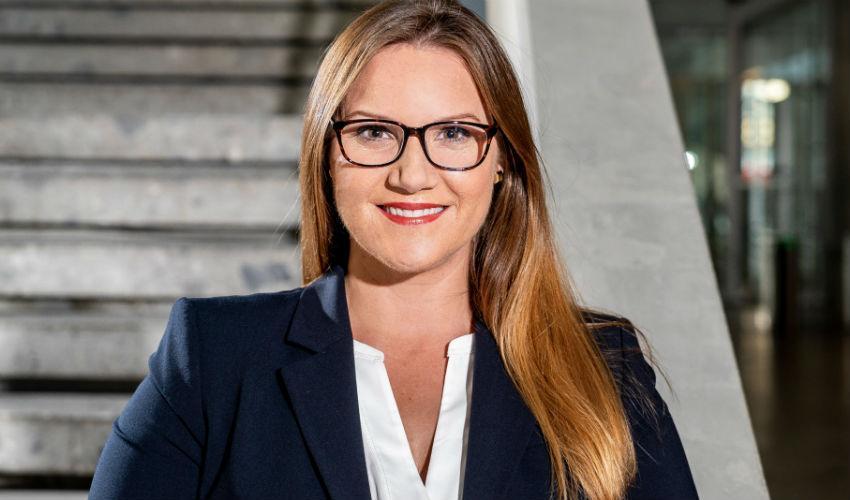
Cassandra Chambers: When Research Stems from Experience on the Ground
AN ASSISTANT PROFESSOR AT BOCCONI SINCE SEPTEMBER, SHE STUDIES HOW ORGANIZATIONS CAN MAINTAIN COOPERATIVE CULTURES ALONGSIDE COMPETITIVE PRESSURES TO PERFORM, SOMETHING SHE STARTED TO ASK HERSELF DURING HER YEARS AS A SALESWOMANCassandra Chambers is not your average Assistant Professor. Her research interests are deeply rooted in seven years of working experience in sales.
Chambers has been an Assistant Professor at Bocconi’s Department of Management and Technology since September 2018. She received a Bachelor’s degree in Political Science from UCLA, then worked in sales for companies in the energy sector and dental product manufacturing. «Both companies had a performance ranking system in place», she recalls, «and in both cases, there used to be a great deal of cooperation among salespeople—we regularly passed leads to each other all the time. However, each time the performance rankings were displayed we would experience some angst. What if by passing a lead we were helping someone get ahead of us in the ranking? Eventually, the issue of how to keep people cooperating (e.g., passing leads), in the presence of competitive pressures became my main research interest».
Cassandra returned to academia in 2011, when she attended a MBA program at the University of Florida. «It was then that I realized I wanted it to become my life. I’ve always been curious and I continued to find myself asking questions about how companies could better motivate employees. My research questions tend to be rooted in real life experiences—from an understanding of what happens on the ground inside actual organizations». She eventually obtained her PhD at the University of Michigan.
Her recent work focuses on how to maintain cooperative cultures in the face of potentially disruptive forces such as performance rankings. In a forthcoming article in the journal Organization Science, she conducted a lab experiment to examine how the introduction of rankings affected groups with thriving cooperative cultures. The experiment divided 592 people into 74 groups and asked them to play a decision-making game for an extended period of time. Participants were given points that were worth money and asked if they would like to transfer some points to others. It cost participants two points to transfer, but the person receiving gained three. If everyone transferred, the benefits of helping would outweigh the costs. When a solid routine of cooperation was established, she disrupted it with the introduction of a performance ranking system and observed that, in fact, the rate of cooperation tumbled to a fraction of its original level. However, combining a performance ranking system (a powerful tool of motivation for top talents who thrive in a competitive environment) with a culture of cooperation isn’t impossible. Prof. Chambers also observed that, when information about pro-social contributions of other people were introduced, the level of cooperation resurged to an almost pre-disruption level.
Another paper explores whether ranking systems can be used to reward acts of cooperation. Set in the context of an online community, it examines how pressures to perform in a ranking create incentives to cooperate, but also lead to instances of cheating as people seek to get ahead in the ranking. However, people that cheated were also on average more cooperative. Prof. Chambers then analyzed what happens to community members when they are punished for cheating. The net effect, she observed, is that they become less and less cooperative than before the punishment. A trade-off, then arises, between enforcing community rules and preserving the cooperative behaviors of these members.
Cassandra jumped into her Italian experience with both feet. With twelve feet, actually, since she moved to Milan with her husband (also a University Professor), their 8-year old twins and her in-laws. The kids are attending a bi-lingual school, and are rapidly learning to speak Italian. One of the things that Professor Chambers loves the most about Milan is its central location. «Milan’s location is perfect for people who love to travel. We’ve been exploring all over Italy and made a few trips outside of Italy to Croatia and Amsterdam».
Find out more
Chambers, C.R. and Baker, W.E., Robust Systems of Cooperation in the Presence of Rankings: How displaying prosocial contributions can offset the disruptive effects of performance rankings. (Forthcoming, Organization Science)
Chambers, C.R., Reputation Rankings, Cheaters, and Maintaining Robust Cooperation, working paper.
Aceves, P., and Chambers, C.R., Social Influence and Social Evaluation in Online Platforms, working paper.
by Fabio Todesco
